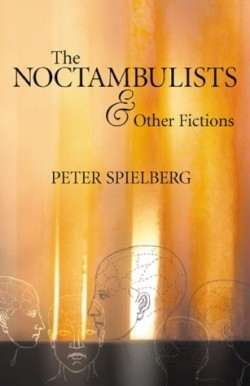The Noctambulists
and Other Fictions
Spielberg’s short fiction allows no space for passive
readers: from the opening pages, this collection demands active interpretive skills. The title of the first story, “Apocrypha,” warns us not to believe all we will be told in the apocalyptic fairy tale that follows. The epigram—Mother Goose’s lines about Jack Spratt and his wife—begins both a children’s literature motif and a critique of a society obsessed with consumerism and consumption. The opening line (“Some years from now when everything should be much better than it is today…”) reverses the usual “once upon a time” both in its reference to an uncertain future rather than a fixed, if mythological, past and in its equivocation—everything should be better.
Spielberg combines the dark vision that is a staple of traditional fairy tales with his own cynical humor—the communal land in this defamiliarised landscape is used both for “old-fashioned hay-rides [and] public caning of recidivists.” More ominously, the green fields of Thrace (“not to be confused with the Thrace of ancient Greece”) have been taken over by “SATE—the Secret Association of Things Edible (not previously thought to have been so)” where the “spread ran the alphabet from edible abacuses… to edible zippers.” In this extended pun on consumerism, everything is (potentially) edible and all desire has been subsumed within the gustatory: “Lord Almighty, that oilcloth apron you’re wearing, Missus, makes my mouth water… I’d like nothing better than to gobble it up right now.” The effect is, at first, clever; it quickly becomes cloying, and pretty soon readers are wading ankle deep in puns:
“Tiens, tiens! Did I hurt you, mon chou?” she asked, her speech artificially flavored with Gallicisms, like imitation gravy thickened with cornstarch. “Let me have a look, sweetie.”
Apparently unable to trust us to get the point without belaboring it, Spielberg overworks his prose in the same way that he overworks his readers.
In essence, all the stories in this collection are “about” the craft of writing; almost any page could be used as a primer for a college comp or creative writing course. But, as a consequence, the stories themselves appear emotionally withholding—no more (or less) than an intellectual workout for writer and reader. This sort of activity is food and drink to the literary critic. But it offers less nourishment for the reader who looks to literature for more than an intellectual exercise.
Reviewed by
Jeannette Boyne
Disclosure: This article is not an endorsement, but a review. The publisher of this book provided free copies of the book to have their book reviewed by a professional reviewer. No fee was paid by the publisher for this review. Foreword Reviews only recommends books that we love. Foreword Magazine, Inc. is disclosing this in accordance with the Federal Trade Commission’s 16 CFR, Part 255.

